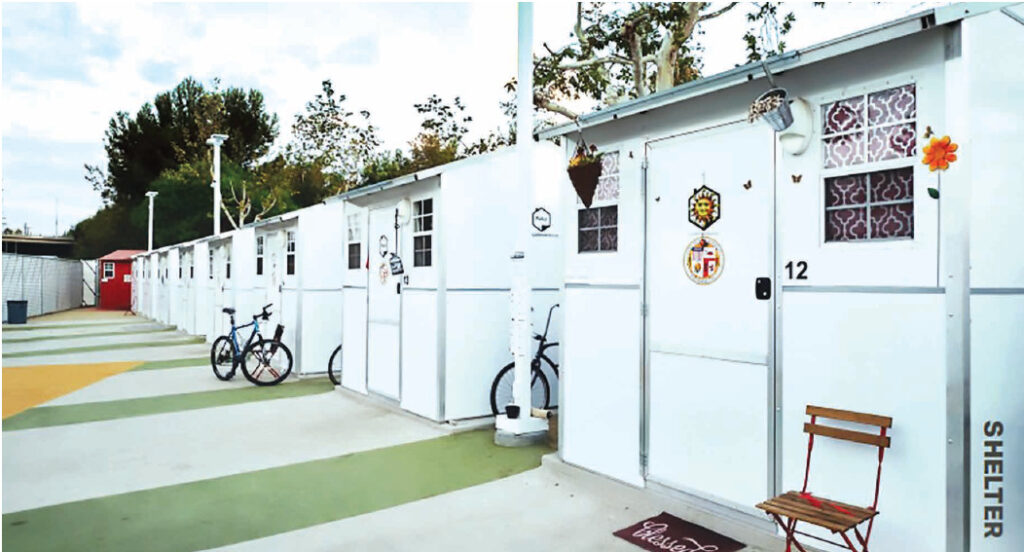Mayor Michael Johnston recently announced the preliminary locations of 11 temporary homeless housing sites, which could include tiny homes or pallet homes.
Tiny homes are movable units, but pallet homes are lighter and can be put together quicker to provide shelter for the unhoused population. Johnston said he hopes to have the temporary housing locations up and running by the end of the year as part of his goal to get 1,000 people off the streets.
“We have access to the construction pipeline of homes that we’ll need,” Johnston said. “We’ll continue the community engagement process to help land these sites and these units to prepare to get people moved off of the streets and into housing.”
According to the mayor’s office, a pallet home or tiny home location could be coming to 1498 Irving St., which is located just on the other side of the District 1 border.
“We do have other sites that we are in current negotiations with that are owned by private landowners,” Johnston said. “The private- land-owning community has been very cooperative and collaborative. Some of them have some details we have to work out with their land before they go public.”

District 1, represented by Councilmember Amanda P. Sandoval, did not have a suggested location from the recent briefing by Johnston, but the mayor said each council district will eventually have a potential location for tiny or pallet homes.
Johnston said the map he unveiled recently will not be a final map of the locations. He said the sites vary between existing structures such as hotels and motels the city has purchased, while the others are vacant land.
Johnston added his office recently met with apartment owners from across the city who represent about 45,000 units. “We’re working directly to bring on leased units, (and) we’re gonna move people directly into those apartment units,” the mayor said.
“We’re still working on hotel conversions that add another source of units, but these (locations) are the ones that we have.”
According to the mayor’s office, a request for proposals is in the works to find providers of wraparound services and site management, including security for the pallet home sites. Another request will seek to find manufacturers of tiny homes.
When asked whether he thought the locations or future locations for temporary homeless housing were being put in neighborhoods that are economically disadvantaged, Johnston said he didn’t think that was true.
“What we’ll see is they actually do represent geographic diversity across the city. They do represent socioeconomic diversity,” he said.
The Denver City Council recently approved a contract of $7 million to purchase 200 pallet homes as part of the initiative to get 1,000 people off the streets. The City Council also extended the homelessness State of Emergency declaration recently, which is now in effect through Sept. 18.

“What We’ll see is that they do actually do represent geographic diversity across the city. They do represent socioeconomic diversity.” Well if this is true, Mayor, then kindly tell us where in your neighborhood, or the neighborhoods of City Council members are you going to place some of these “micro communities? If you are going to demand we acquiesce to the needs of the indigent, then it only seems fair that you, and the rest of the City Council share the burden alongside us.
PJ Clark, you are correct. Johnston and Cole Chandler have not only selectively chosen certain neighbourhoods, they have ignored the fears on those whose lives will be endangered by these micro communities.
I would like to know more about it I have a friend who’s homeless and needs a place to live.
No micro communities in Washington Park and Cherry Creek either. Johnston is not concerned with equity. He is concerned with his political aspirations. There will be no background checks. No sobriety requirements. Johnston does not have staff, operators, or personnel available for these homeless shelters. There will be no transparency. Registered Neighbourhood Organizations are responsible for contacting law enforcement in the event of an emergency, not the micro community organization. Current micro communities are violating sanitation and health laws. There have been four deaths between two existing micro communities. Gun violence and drug trafficking are natural. There is no barrier to entrance. Seeking “Services” is voluntary. These individuals are not interested in services, and services are meagre at best. Johnston is deliberately placing neighbourhoods in danger. He is not concerned about anyone’s safety.